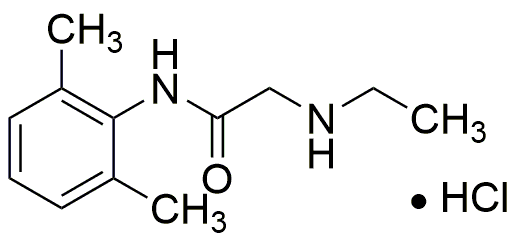Norlidocaine hydrochloride is widely utilized in research focused on:
- Local Anesthesia: This compound is primarily used in medical settings as a local anesthetic, providing effective pain relief during minor surgical procedures.
- Pharmaceutical Development: Researchers leverage norlidocaine hydrochloride in the formulation of new anesthetic drugs, enhancing efficacy and patient comfort.
- Cardiovascular Research: It is employed in studies related to cardiac arrhythmias, helping scientists understand its effects on heart function and rhythm.
- Analgesic Studies: The compound is used to investigate pain management strategies, offering insights into more effective treatment protocols for chronic pain conditions.
- Veterinary Medicine: Norlidocaine hydrochloride is also applied in veterinary practices, ensuring safe and effective anesthesia for animals during surgical procedures.
General Information
Properties
Safety and Regulations
Applications
Norlidocaine hydrochloride is widely utilized in research focused on:
- Local Anesthesia: This compound is primarily used in medical settings as a local anesthetic, providing effective pain relief during minor surgical procedures.
- Pharmaceutical Development: Researchers leverage norlidocaine hydrochloride in the formulation of new anesthetic drugs, enhancing efficacy and patient comfort.
- Cardiovascular Research: It is employed in studies related to cardiac arrhythmias, helping scientists understand its effects on heart function and rhythm.
- Analgesic Studies: The compound is used to investigate pain management strategies, offering insights into more effective treatment protocols for chronic pain conditions.
- Veterinary Medicine: Norlidocaine hydrochloride is also applied in veterinary practices, ensuring safe and effective anesthesia for animals during surgical procedures.
Documents
Safety Data Sheets (SDS)
The SDS provides comprehensive safety information on handling, storage, and disposal of the product.
Product Specification (PS)
The PS provides a comprehensive breakdown of the product’s properties, including chemical composition, physical state, purity, and storage requirements. It also details acceptable quality ranges and the product's intended applications.
Certificates of Analysis (COA)
Search for Certificates of Analysis (COA) by entering the products Lot Number. Lot and Batch Numbers can be found on a product’s label following the words ‘Lot’ or ‘Batch’.
Numéro de catalogue
Numéro de lot/série
Certificates Of Origin (COO)
This COO confirms the country where the product was manufactured, and also details the materials and components used in it and whether it is derived from natural, synthetic, or other specific sources. This certificate may be required for customs, trade, and regulatory compliance.
Numéro de catalogue
Numéro de lot/série
Safety Data Sheets (SDS)
The SDS provides comprehensive safety information on handling, storage, and disposal of the product.
DownloadProduct Specification (PS)
The PS provides a comprehensive breakdown of the product’s properties, including chemical composition, physical state, purity, and storage requirements. It also details acceptable quality ranges and the product's intended applications.
DownloadCertificates of Analysis (COA)
Search for Certificates of Analysis (COA) by entering the products Lot Number. Lot and Batch Numbers can be found on a product’s label following the words ‘Lot’ or ‘Batch’.
Numéro de catalogue
Numéro de lot/série
Certificates Of Origin (COO)
This COO confirms the country where the product was manufactured, and also details the materials and components used in it and whether it is derived from natural, synthetic, or other specific sources. This certificate may be required for customs, trade, and regulatory compliance.


